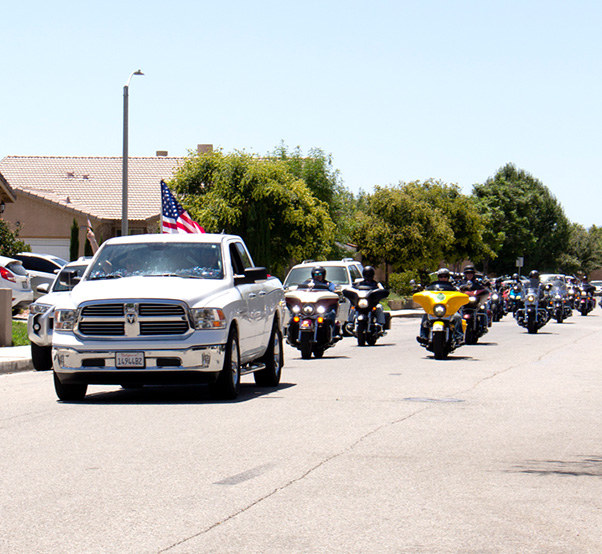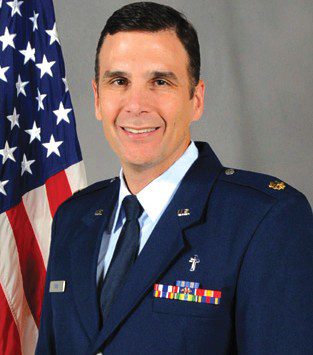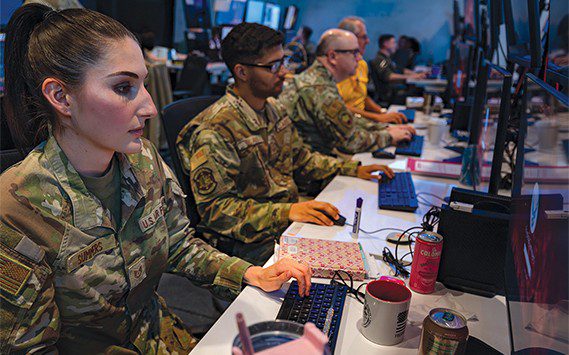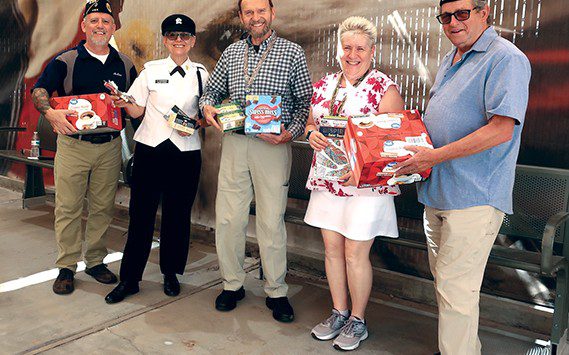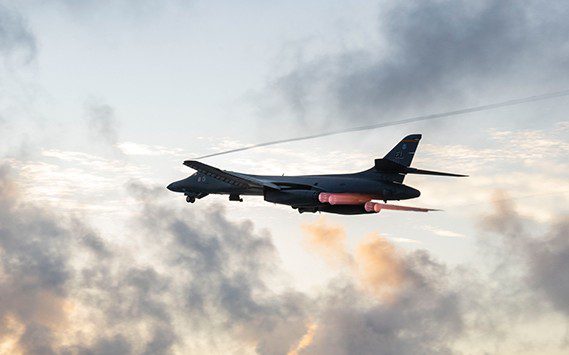by Dennis Andersen, special to Aerotech News
LANCASTER, Calif.–The signs were simple: ” Welcome Home, Walter,” and “We Love You, Walter,” and “Semper Paratus,” the U.S. Coast Guard motto, meaning “Always Prepared.”
Uniformed Scouts held aloft Old Glory and a Coast Guard flag, while Walter Sapp, 76, waited on the front lawn, masked, and wheel-chair mobile. In the distance, one could hear the thunder of motorcycles approaching. Sapp watched and waited, not knowing what to expect.
“I never leave the house without my mask,” he said. “This is serious.”
Then the Harley-Davidsons and other big bikes began rolling by in pairs, riders saluting.
Sapp’s ordeal with COVID-19, which continues four months later, began in March when his wife, Susan, noted that he had a fever. They drove around town, seeking a drug store-pharmacy that would have an electronic thermometer, “but they were already sold out everywhere.”
He did not want to go to a regular doctor’s appointment the next day, but Susan insisted. They got to the doctor’s office and his regular care physician noted fever, and that his oxygen level was dangerously low. This was the week that Gov. Gavin Newsom ordered the first lockdown.
“He (the doctor) called 911, and that is the last thing that I remember.”
Sapp’s circumstances were dire. He had a number of markers that could complicate his chances for survival. He was a 76-year-old African-American male, with diabetes, and underlying conditions from his exposures to chemicals during the Vietnam War.
Sapp, a retired U.S. Coast Guard lieutenant commander, believed he had done well enough in life when he survived Vietnam as a fighting sailor in what was called “the brown water navy,” boats that fought the Viet Cong on coastal and inland waterways 50 years ago.
He never got a “Welcome Home” parade for that. But on July 11, 2020, he got a parade and salute for surviving COVID-19, the novel coronavirus, the virus that has killed more than 130,000 Americans, many of them older citizens. More than 3 million Americans are infected, with Los Angeles County one of the nation’s hot spots.
“I spent three months, and five days in the hospital,” Sapp said in an interview from his home. “And 39 days of it was in a coma. I don’t remember anything.”
Sapp, known across the community as a veterans’ community supporter and Loyal Knight of Elks Lodge 1625 in Lancaster, was welcomed home by a thundering procession of motorcyclists from Patriot Guard Riders, Patriot Crusaders, bikers who ride with the American Legion and Veterans of Foreign Wars. Following in cars were vet supporters from Sapp’s own military support group, Coffee4Vets, as well as Vets 4 Veterans, and Point Man of the Antelope Valley and other groups.
The majority of fatalities have been above the age of 65, with underlying health conditions, and disproportionate numbers of African-American deaths.
“At one point they expected that he would die, but I would not let that happen,” his wife said.
Rather than increasing drugs for comfort, she insisted on a tracheotomy. After about six weeks in the hospital, he was transferred to Greater West Los Angeles VA Healthcare Center.
“I had already been in the ICU,” Sapp recalled. “I had tracheotomy, ventilator, dialysis and I cannot remember anything.”
When he regained consciousness and barely aware of surroundings, he said, “I thought I was in Canada. I kept asking how was my wife going to bring my truck up from Seattle to Canada.”
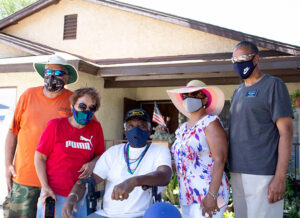
)
To be able to return home a little over a week ago, he had to regain weight, and muscle mass. He spent weeks in physical therapy. Dialysis, he said, he doesn’t mind, “because it keeps me alive.”
Meanwhile, family, friends and veterans supporters kept track of the Sapps’ ordeal with updates on social media.
In the Coast Guard, Sapp lived an adventurous life, returning home from Vietnam as a petty officer, and entering Officer Candidate School. After a couple of decades of war, pursuing drug smugglers, and rescues at sea, the Coast Guard wanted him to take a desk job in New York, at the Coast Guard’s offices in Brooklyn; he turned them down. His kids were on Kodiak Island, and he said he would rather go to sea than go to New York.
With a master’s degree from George Washington University, he worked for many years as the chief finance officer for the city of Valdez, Alaska.
Post retirement in Lancaster, he has been active in veterans support events, and rising in the orders and honors of the Elks Lodge.
“They are all wonderful people, the Elks,” he said.
He and Susan agreed that Saturday was “a wonderful party.”
“We didn’t expect it,” she said. “He still needs to get stronger, but he is getting a little better every day.”
Editor’s note: Dennis Anderson is a licensed clinical social worker. An Army veteran paratrooper, he covered the Iraq War as an embedded reporter. At High Desert Medical Group, he works on veterans and community mental health initiatives.






